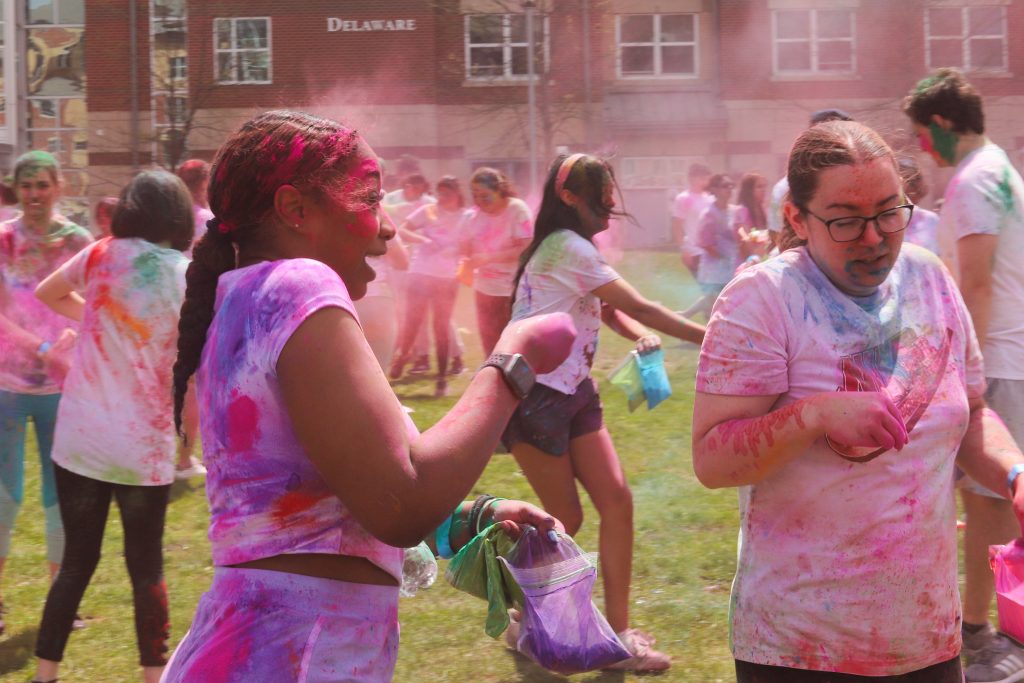The campus was alive and joyous this past Saturday with the annual celebration of Holi, a Hindu spring festival, on Newing College’s field. The event lasted for over two hours, amassing more than 100 people dressed in white shirts, all ready to throw colorful pouches at each other.
With a DJ in the background setting the soundtrack, participants were more than ready to run across the Newing Field to hurl gulal — a colored powder typically used in some Hindu rituals — at their friends and others taking part. Several rounds of throwing gulal at one another left students and the entire field covered in a cacophony of colors from head to toe by the time the event ended.
Many attendees, like Alvina Prabhu, a freshman majoring in integrative neuroscience, said they found the event enjoyable.
“This was my first Holi celebration [at Binghamton] University, and I thought it was well organized,” Prabhu said. “They organized it in a very organized, yet chaotic way. It was fun!”
Also known as the “Festival of Colors, Love and Spring,” Holi is a traditional Indian festival meant to welcome spring, say goodbye to winter and welcome new and growing love. It is also meant to invoke a good harvest during the spring.
BU’s event was organized by Delta Epsilon Psi, a South Asian fraternity at BU, and the Hindu Student Council (HSC). Tickets were sold weeks in advance for $5 per ticket, with all proceeds going to the Juvenile Diabetes Research Foundation, the world’s largest nonprofit with a mission to cure, treat and prevent Type 1 Diabetes.
The festival is celebrated over two days, from night to day, and many students are away from home when the festival is typically observed. However, Delta Epsilon Psi and the HSC have found a way over the years for students to celebrate Holi on campus.
Holi is typically celebrated in India on the last Purnima — or full moon — of the Hindu lunisolar calendar month, honoring spring’s arrival during the month of Phalguna, which is typically seen around mid-March in the Gregorian calendar. The festival is meant to commemorate the good spring harvests and fertile land for farmers, and with the coming of spring, many Hindus take this celebration as a reason to welcome change and leave behind any unwanted emotions and thoughts.
The festival is derived from the Hindu legends of the gods Radha and Krishna, celebrating their eternal love, as well as the legend of Vishnu, or the God of Preservation, and Narasimha Narayana, the God of Protection. Holi is meant to celebrate the triumph of good over evil, with Vishnu winning the fight for Hiranyakashipu, an Asura king, against Narasimha Narayana.
The Hindu legend of Radha and Krishna is also what inspired the custom of throwing gulal at one another during the festival. The legend goes, Krishna was worried that Radha wouldn’t love him because he had dark skin and Radha had fair skin. Krishna’s mother suggested that he go and color Radha’s face in a color of his choosing, and when this happened, Radha fell in love with Krishna.
This legend serves as a reminder of the love people have for one another. Now, during Holi, lovers apply gulal on the faces of their significant others to express their love and affection for one another.
Students have adapted to the circumstances of living on campus by organizing this event for students who celebrate Holi. While it isn’t a typical Holi festival, students at BU appreciated the efforts the organizing parties go through to ensure the festival is fun and memorable.
One of those students was Meghana Gogineni, a freshman majoring in integrative neuroscience. Gogineni said BU had done an excellent job organizing events for her and her friends to attend this past school year.
“I thought the event was a lot of fun,” Gogineni said. “There is nothing better than a little organized chaos!”
Students came and went throughout the festival covered in a myriad of colors that was sure to leave a lasting impression, both on their white t-shirts and in their memories. With the success of this year’s Holi celebration, nobody would be surprised if the event was more crowded next year.



